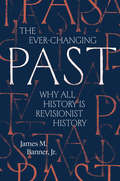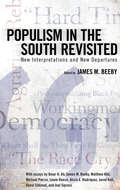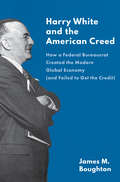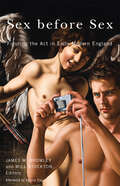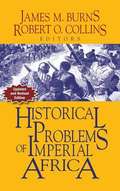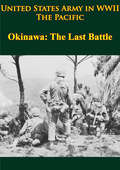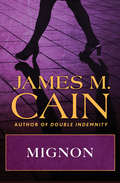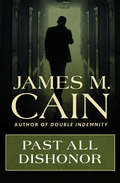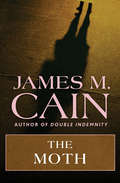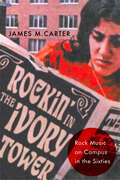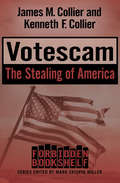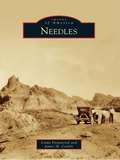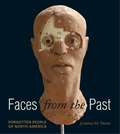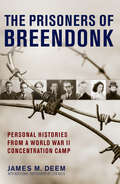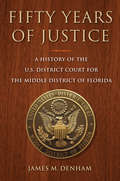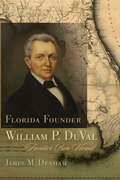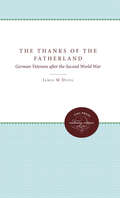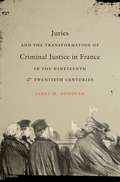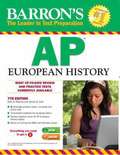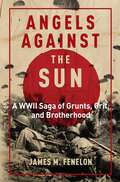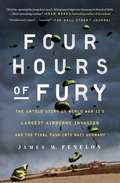- Table View
- List View
The Ever-Changing Past: Why All History Is Revisionist History
by James M. Banner Jr.An experienced, multi-faceted historian shows how revisionist history is at the heart of creating historical knowledge"A rallying cry in favor of historians who, revisiting past subjects, change their minds. . . . Rewarding reading."—Kirkus Reviews History is not, and has never been, inert, certain, merely factual, and beyond reinterpretation. Taking readers from Thucydides to the origin of the French Revolution to the Civil War and beyond, James M. Banner, Jr. explores what historians do and why they do it. Banner shows why historical knowledge is unlikely ever to be unchanging, why history as a branch of knowledge is always a search for meaning and a constant source of argument, and why history is so essential to individuals&’ awareness of their location in the world and to every group and nation&’s sense of identity and destiny. He explains why all historians are revisionists while they seek to more fully understand the past, and how they always bring their distinct minds, dispositions, perspectives, and purposes to bear on the subjects they study.
Populism in the South Revisited: New Interpretations and New Departures
by James M. BeebyThe Populist Movement was the largest mass movement for political and economic change in the history of the American South until the Civil Rights Movement of the 1950s and 1960s. The Populist Movement in this book is defined as the Farmers' Alliance and the People's Party, as well as the Agricultural Wheel and Knights of Labor in the 1880s and 1890s. The Populists threatened the political hegemony of the white racist southern Democratic Party during populism's high point in the mid-1890s; and the populists threw the New South into a state of turmoil Populism in the South Revisited: New Interpretations and New Departures brings together nine of the best new works on the populist movement in the South that grapple with several larger themes—such as the nature of political insurgency, the relationship between African Americans and whites, electoral reform, new economic policies and producerism, and the relationship between rural and urban areas—in case studies that center on several states and at the local level. Each essay offers both new research and new interpretations into the causes, course, and consequences of the populist insurgency. One essay analyzes how notions of debt informed the Populist insurgency in North Carolina, the one state where the Populists achieved statewide power, while another analyzes the Populists' failed attempts in Grant Parish, Louisiana, to align with African Americans and Republicans to topple the incumbent Democrats. Other topics covered include populist grassroots organizing with African Americans to stop disfranchisement in North Carolina; the Knights of Labor and the relationship with populism in Georgia; organizing urban populism in Dallas, Texas; Tom Watson's relationship with Midwest Populism; the centrality of African Americans in populism, a comparative analysis of Populism across the Deep South, and how the rhetoric and ideology of populism impacted socialism and the Garvey movement in the early twentieth century. Together these studies offer new insights into the nature of southern populism and the legacy of the Peoples' Party in the South.
Harry White and the American Creed: How a Federal Bureaucrat Created the Modern Global Economy (and Failed to Get the Credit)
by James M. BoughtonThe life of a major figure in twentieth‑century economic history whose impact has long been clouded by dubious allegations &“Harry Dexter White has always been the mystery man at the center of America&’s international economic policy in the 1930s and 1940s. James Boughton helps demystify him in this rich, enlightening, and most interesting volume.&”—Douglas Irwin, author of Clashing over Commerce: A History of U.S. Trade Policy Although Harry Dexter White (1892–1948) was arguably the most important U.S. government economist of the twentieth century, he is remembered more for having been accused of being a Soviet agent. During the Second World War, he became chief advisor on international financial policy to Secretary of the Treasury Henry Morgenthau, a role that would take him to Bretton Woods, where he would make a lasting impact on the architecture of postwar international finance. However, charges of espionage, followed by his dramatic testimony before the House Un-American Activities Committee and death from a heart attack a few days later, obscured his importance in setting the terms for the modern global economy. In this book, James Boughton rehabilitates White, delving into his life and work and returning him to a central role as the architect of the world&’s financial system.
Tearing Down Walls
by James M. BoughtonThis volume - the fifth in a series of histories of the International Monetary Fund - examines the 1990s, a tumultuous decade in which the IMF faced difficult challenges and took on new and expanded roles. Among these were assisting countries that had long operated under central planning to manage transitions toward market economies, helping countries in financial crisis after sudden loss of support from private financial markets, adapting surveillance to reflect the growing acceptance of international standards for economic and financial policies, helping low-income countries grow and begin to eradicate poverty while staying within its mandate as a monetary institution, and providing adequate financial assistance to members in an age of limited official resources. The IMF's successes and setbacks in facing these challenges provide valuable lessons for an uncertain future.
Sex before Sex: Figuring the Act in Early Modern England
by James M. Bromley Will StocktonWhat is sex exactly? Does everyone agree on a definition? And does that definition hold when considering literary production in other times and places? Sex before Sex makes clear that we cannot simply transfer our contemporary notions of what constitutes a sex act into the past and expect them to be true for the people who were then reading literature and watching plays. The contributors confront how our current critical assumptions about definitions of sex restrict our understanding of representations of sexuality in early modern England. Drawing attention to overlooked forms of sexual activity in early modern culture, from anilingus and interspecies sex to &“chin-chucking&” and convivial drinking, Sex before Sex offers a multifaceted view of what sex looked like before the term entered history. Through incisive interpretations of a wide range of literary texts, including Romeo and Juliet, The Comedy of Errors, Paradise Lost, the figure of Lucretia, and pornographic poetry, this collection queries what might constitute sex in the absence of a widely accepted definition and how a historicized concept of sex affects the kinds of arguments that can be made about early modern sexualities.Contributors: Holly Dugan, George Washington U; Will Fisher, CUNY–Lehman College; Stephen Guy-Bray, U of British Columbia; Melissa J. Jones, Eastern Michigan U; Thomas H. Luxon, Dartmouth College; Nicholas F. Radel, Furman U; Kathryn Schwarz, Vanderbilt U; Christine Varnado, U of Buffalo–SUNY.
A History of Sub-Saharan Africa
by Robert O. Collins James M. BurnsIn a trawl through the entire sweep of sub-Saharan history, the authors have written an accessible introduction for students and general readers. The opening chapter on geography and climate frames the discussion, demonstrating how the environment has shaped the societies and cultures of those living in the region. Thereafter they describe the rise of states and empires in the classical period, the slave trade within Africa and beyond to the Americas, and the European conquest. The concluding section focuses on Africa in the twentieth century as it gains independence and searches for a new identity beyond colonialism. While the authors mull over the debates which have shaped the study of African history, at the center of this story are the tragedies, triumphs and the resilience of the African people. The book is illustrated with photographs, maps, and sidebars which feature the salient points on either side of the debates.
Historical Problems Of Imperial Africa
by Robert O. Collins James M. BurnsThis book is designed to inform, engage, and stimulate discussions among its readers. Collins and his collaborators have included authoritative statements and analysis by renowned scholars. A distinctive characteristic of the whole anthology is the range of interpretations of classic and recent research. The book offers a full spectrum of emotionally charged theories. Each section presents a set of conflicting arguments to show the state of debates on these highly controversial issues. Extensive commentary by the editors leads the reader through this treasury of theories and dramatically highlights the development of the field.
United States Army in WWII - the Pacific - Okinawa: [Illustrated Edition] (United States Army in WWII)
by James M. Burns John Stevens Roy E. Appleman Russell A. Gugeler[Includes 2 tables, 3 charts, 21 maps and 88 illustrations]On 3 October 1944 American forces in the Pacific Ocean Areas received a directive to seize positions in the Ryukyu Islands (Nansei Shoto). Okinawa is the most important island of the Ryukyu Group, the threshold of the four main islands of Japan. The decision to invade the Ryukyus signalized the readiness of the United States to penetrate the inner ring of Japanese defenses. For the enemy, failure on Okinawa meant that he must prepare to resist an early invasion of the homeland or surrender.The present volume [Of the United States Army in WWII series] concerns one of the most bitterly fought battles of the Pacific war, in which the Army, the Marine Corps, and the Navy all played a vital part. In order to make the Army's role and the campaign as a whole as intelligible as possible the historians have treated in detail the operations of the Marine Corps units attached to Tenth Army, and have also sketched the contribution of the Navy both in preliminary operations against Okinawa and in the campaign itself. Another characteristic of this as of other volumes on Pacific campaigns is that tactical action is treated on levels lower than those usually presented in the history of operations in the European theaters. The physical limitations of the terrain fought over in the Pacific restricted the number and size of the units which could be employed and brought into sharp focus the operations of regiments, battalions, and smaller units. A wealth of verified material on such operations is available for all theaters, but it is only that of the Pacific which can be used extensively, since in other theaters the actions of smaller units are lost in the broad sweep of great distances and large forces. The description of small-unit action has the merit of giving the nonprofessional reader a fuller record of the nature of the battlefield in modern war, and the professional reader a better insight into troop leading.
Mignon
by James M. CainA Union army invalid meets a comely Louisiana rebel and never looks backThe Union has captured New Orleans, and Bill Cresap has come to reap the profits. A school friend has a line on some easy money, and Cresap is eager to turn carpetbagger. But when he lands in the Crescent City, still nursing a leg wound from Chancellorsville, he finds that his friend has vanished and taken their start-up capital with him. Just when despair threatens to overpower him, Mignon Fournet arrives to overwhelm him instead. A Creole widow with rebel sympathies and hopeful eyes, she has come to Cresap in desperate need. The army has arrested her father and she will do whatever it takes to find out where he’s detained and what he’s charged with. She begs Cresap to use his army connections to find him. Cresap soon discovers that Mignon’s father shipped supplies to the Confederate commander; he could pay for treason with his life. Dazzled by the flirtatious Mignon, Cresap agrees to help free him. Although the veteran’s army days are behind him, his war is just starting to heat up.
Past All Dishonor
by James M. CainA Confederate spy risks his life to win the heart of a fallen womanEarly in the Civil War, the Confederacy sends Roger Duval to Sacramento, to keep an eye on the situation in California in hopes of turning the Western territory towards the Southern cause. It&’s a plush assignment, well out of the line of fire, but Duval hasn&’t been there long before he comes into mortal danger. On a swim in the Sacramento River, he gets knocked on the head by a paddleboat, and is drowning in the muck when Morina, a quick-witted woman of the night, tosses him a rope. Suffocated by instant, irresistible love, Roger follows Morina to her home turf: Virginia City, Nevada. For the miners, gamblers, and gunfighters who populate this hardscrabble town, her price is negotiable. But for a man in love, she charges a thousand dollars. Roger will sacrifice body, mind, and soul to get that money—but will his sacrifice be enough to make her love him?
The Moth
by James M. CainA novel of a privileged young man&’s twisting, troubled journey through Depression-era America, by the author of Mildred Pierce. From birth, Jack Dillon is a golden child. Blessed with blond locks, glittering eyes, and a perfect voice, he is the most popular child singer in Baltimore. But when puberty robs him of his voice and the stock market wipes out his family fortune, Jack is forced to rebuild. Over the next fifteen years, Jack will see it all. From Maryland to California and back again, he will become a football star, a soldier, and a tramp. Through it all, he never loses his eye for beauty, or his hunger for a woman he has known since childhood. To find happiness in the face of the Depression, Jack will have to remember that no matter how the world has changed him, part of his soul remains as pure as the first note he sang.
Rockin' in the Ivory Tower: Rock Music on Campus in the Sixties (CERES: Rutgers Studies in History)
by James M. CarterHistories of American rock music and the 1960s counterculture typically focus on the same few places: Woodstock, Monterey, Altamont. Yet there was also a very active college circuit that brought edgy acts like the Jefferson Airplane and the Velvet Underground to different metropolitan regions and smaller towns all over the country. These campus concerts were often programmed, promoted, and reviewed by students themselves, and their diverse tastes challenged narrow definitions of rock music. Rockin’ in the Ivory Tower takes a close look at two smaller universities, Drew in New Jersey and Stony Brook on Long Island, to see how the culture of rock music played an integral role in student life in the late 1960s. Analyzing campus archives and college newspapers, historian James Carter traces connections between rock fandom and the civil rights protests, free speech activism, radical ideas, lifestyle transformations, and anti-war movements that revolutionized universities in the 1960s. Furthermore, he finds that these progressive students refused to segregate genres like folk, R&B, hard rock, and pop. Rockin’ in the Ivory Tower gives readers a front-row seat to a dynamic time for the music industry, countercultural politics, and youth culture.
Votescam: The Stealing of America (Forbidden Bookshelf #15)
by James M. Collier Kenneth F. CollierThe groundbreaking investigation into the corruption of American democracy, beginning at the voting booth This book is the culmination of a 25-year investigation into computerized vote fraud in the United States. Journalists James and Kenneth Collier pose the question, "Why can't we vote the bastards out?" Their answer: "Because we didn't even vote the bastards in." Votescam fills in the blanks for anyone who senses that their ballot is worthless, but does not know why. It tracks down, confronts, and calls the names of Establishment thieves who silently steal votes for their own profit. It comes face-to-face with the Supreme Court justice who buried key vote fraud evidence; the most powerful female publisher in America, who refused to permit her newspapers and television stations to expose vote rigging; the Attorney General who jailed Jim Collier to avoid an investigation into vote fraud; and a cast of weak-kneed, corrupt politicians, lawyers, and members of the media entangled in a massive crime, but who have yet to be held accountable. First published in 1992, this groundbreaking exposé has been updated by journalist Victoria Collier, daughter and niece, respectively, of the late James and Kenneth Collier, and editor of Votescam.org, to reflect modern threats to American democracy. As computers grow ever more powerful, the need to read Votescam is increasingly urgent.
Needles
by James M. Conkle Linda FitzpatrickNeedles is located at the borders of California and Arizona on the west bank of the Colorado River, once serving as an important transportation hub in California. During the mid-1800s, the steamboat trade flourished here as gold, silver, goods, and passengers were transported along the Colorado River. The Atlantic and Pacific Railroad, now known as the Santa Fe, replaced the steamboats when tracks were laid through the area starting in 1883. The charter city was founded in 1913. America's "Mother Road," Route 66, built through downtown Needles in 1926, spurred growth as new businesses opened to serve travelers. Needles was named for its striking rock formations and is famous for its summer temperatures, but it is ultimately known and remembered as a living icon of an early 20th century town on historic Route 66.
Bodies from the Ash: Life and Death in Ancient Pompeii
by James M. DeemIn ancient times, Pompeii was one of the largest cities in the Roman Empire. Its 20,000 inhabitants lived in the shadow of Vesuvius, which they believed was nothing more than a mountain. But Vesuvius was a volcano. And on the morning of August 24, A. D. 79, Vesuvius began to erupt. Within twenty-four hours, the entire city of Pompeii and many of its citizens had been utterly annihilated. It was not until hundreds of years later that Pompeii saw daylight again, as archaeological excavations began to unearth what had been buried under layers of volcanic rubble. Digging crews expected to find buildings and jewelry and other treasures, but they found something unexpected, too: the imprints of lost Pompeiians, their deaths captured as if by photographic images in volcanic ash.
Bodies from the Bog
by James M. DeemIn 1952, Danish workmen digging in a peat bog made an astonishing discovery. Their shovels struck the head of a dead man, his face flattened by the weight of the peat and his skin as brown as the earth in which he lay. Who was he and how had he come to be there? Scientists examined him and learned the answers to these questions and many more, including how he died and even what he ate on his last day. In this fascinating glimpse into the world of the bog people, Deem explains to readers who those people were, how they lived, what they believed, and how peat bogs preserve bodies.
Faces from the Past: Forgotten People of North America
by James M. DeemWhen skeletons from centuries ago are discovered, scientists want to study them to discover information about the lives , deaths , time and place in history of these people so that the nameless, unknown people can be brought back to life, remembered, and honoured.
The Prisoners of Breendonk: Personal Histories from a World War II Concentration Camp
by James M. DeemFort Breendonk was built in the early 1900s to protect Antwerp, Belgium, from possible German invasion. Damaged at the start of World War I, it fell into disrepair . . . until the Nazis took it over after their invasion of Belgium in 1940. Never designated an official concentration camp by the SS and instead labeled a "reception" camp where prisoners were held until they were either released or transported, Breendonk was no less brutal. About 3,600 prisoners were held there--just over half of them survived. As one prisoner put it, "I would prefer to spend nineteen months at Buchenwald than nineteen days at Breendonk." With access to the camp and its archives and with rare photos and artwork, James M. Deem pieces together the story of the camp by telling the stories of its victims--Jews, communists, resistance fighters, and common criminals--for the first time in an English-language publication. Leon Nolis's haunting photography of the camp today accompanies the wide range of archival images. The story of Breendonk is one you will never forget.
Fifty Years of Justice: A History of the U.S. District Court for the Middle District of Florida
by James M. DenhamThe verdicts have made headlines, but little is known about the inner workings of the court in which they were delivered. In Fifty Years of Justice, James Denham presents the fascinating history of the U.S. Middle District Court of Florida from its founding in 1962 to the present. Readers will discover the intricacies of rulings, the criminal defendants and civil litigants, and the dedicated officials—the unsung heroes—who keep the justice system running day to day. From desegregation to discrimination, espionage to the environment, trafficking to terrorism, and a host of cases in between, litigation in these courtrooms has shaped and shaken both state and nation.
Florida Founder William P. DuVal: Frontier Bon Vivant
by James M. DenhamThe first full-length biography of the well-connected, but nearly forgotten frontier politician of antebellum America.The scion of a well-to-do Richmond, Virginia, family, William Pope DuVal (1784–1854) migrated to the Kentucky frontier as a youth in 1800. Settling in Bardstown, DuVal read law, served in Congress, and fought in the War of 1812.In 1822, largely because of the influence of his lifelong friend John C. Calhoun, President James Monroe appointed DuVal the first civil governor of the newly acquired Territory of Florida. Enjoying successive appointments from the Adams and Jackson administrations, DuVal founded Tallahassee and presided over the territory’s first twelve territorial legislative sessions, years that witnessed Middle Florida’s development into one of the Old Southwest’s most prosperous slave-based economies. Beginning with his personal confrontation with Miccosukee chief Neamathla in 1824 (an episode commemorated by Washington Irving), DuVal worked closely with Washington officials and oversaw the initial negotiations with the Seminoles.A perennial political appointee, DuVal was closely linked to national and territorial politics in antebellum America. Like other “Calhounites” who supported Andrew Jackson’s rise to the White House, DuVal became a casualty of the Peggy Eaton Affair and the Nullification Crisis. In fact he was replaced as Florida governor by Mrs. Eaton’s husband, John Eaton. After leaving the governor’s chair, DuVal migrated to Kentucky, lent his efforts to the cause of Texas Independence, and eventually returned to practice law and local politics in Florida. Throughout his career DuVal cultivated the arts of oratory and story-telling—skills essential to success in the courtrooms and free-for-all politics of the American South. Part frontiersman and part sophisticate, DuVal was at home in the wilds of Kentucky, Florida, Texas, and Washington City. He delighted in telling tall tales, jests, and anecdotes that epitomized America’s expansive, democratic vistas. Among those captivated by DuVal’s life and yarns were Washington Irving, who used DuVal’s tall tales as inspiration for his “The Early Experiences of Ralph Ringwood,” and James Kirke Paulding, whose “Nimrod Wildfire” shared Du Val’s brashness and bonhomie.“In large brushstrokes, but with great attention to detail, Denham embeds DuVal’s life in a wider portrait of the young Republic, and particularly in issues affecting the western states and the former Spanish borderlands Readers will find in this book a well-researched and well-written history that informs on many levels.” —The Historian“Relying on a variety of sources extending well beyond DuVal’s papers, Denham’s work provides an intriguing account of a southerner immersed in the dynamics of politics at both the local and national levels. The study will be a definitive must for any student of antebellum regional and national history.” —The Journal of Southern History
The Thanks of the Fatherland: German Veterans After the Second World War
by James M. DiehlAn account of the problems facing German veterans after WWII and the ways in which they were addressed in the decade following Germany's defeat. The primary focus is on the major pieces of veterans' legislation passed in the early years of the German Federal Republic. Historical context is provided by the first two chapters and the conclusion, which compares and contrasts the fate of veterans and their sociopolitical impact on German society following the two world wars.Originally published in 1993.A UNC Press Enduring Edition -- UNC Press Enduring Editions use the latest in digital technology to make available again books from our distinguished backlist that were previously out of print. These editions are published unaltered from the original, and are presented in affordable paperback formats, bringing readers both historical and cultural value.
Juries and the Transformation of Criminal Justice in France in the Nineteenth and Twentieth Centuries
by James M. DonovanJames Donovan takes a comprehensive approach to the history of the jury in modern France by investigating the legal, political, sociocultural, and intellectual aspects of jury trial from the Revolution through the twentieth century. He demonstrates that these juries, through their decisions, helped shape reform of the nation's criminal justice system.From their introduction in 1791 as an expression of the sovereignty of the people through the early 1900s, argues Donovan, juries often acted against the wishes of the political and judicial authorities, despite repeated governmental attempts to manipulate their composition. High acquittal rates for both political and nonpolitical crimes were in part due to juror resistance to the harsh and rigid punishments imposed by the Napoleonic Penal Code, Donovan explains. In response, legislators gradually enacted laws to lower penalties for certain crimes and to give jurors legal means to offer nuanced verdicts and to ameliorate punishments. Faced with persistently high acquittal rates, however, governments eventually took powers away from juries by withdrawing many cases from their purview and ultimately destroying the panels' independence in 1941.
Barron's AP European History (7th Edition)
by Seth A. Roberts James M. EderIn-depth preparation for the AP European History exam features: Two full-length model AP exams with all questions answered and explained A 15-chapter summary of European history for review, starting with Europe during the Italian Renaissance and progressing to Europe in the twenty-first century Essay questions and multiple-choice questions with answers following each chapter Extensive charts that summarize Europe's history The manual can be purchased alone or with an optional CD-ROM that presents two additional full-length practice tests with automatic scoring and fully explained answers. BONUS! An exclusive online exam included with the purchase of the book or the book with CD-ROM.
Angels Against the Sun: A WWII Saga of Grunts, Grit, and Brotherhood
by James M. FenelonIn the tradition of Band of Brothers, historian and former paratrooper James M. Fenelon offers a grunt&’s-eye view of the 11th Airborne&’s heroic campaign to liberate the Philippines in World War II. A soldier&’s history at its best.A Grunt&’s-Eye View of Pacific WarfareThe Pacific theater of World War II pitted American fighting men against two merciless enemies: the relentless Japanese army and the combined forces of monsoons, swamps, mud, privation, and disease. General Joseph Swing&’s rowdy paratroopers of the 11th Airborne Division— nicknamed the &“Angels&”—fought in some of the war&’s most dramatic campaigns, from bloody skirmishes in Leyte&’s unforgiving rainforests to the ferocious battles on Luzon, including the hellish urban combat of Manila. The Angels were trained as elite shock troops, but high American casualties often forced them into action as ground-pounding infantrymen. Surviving on airdropped supplies and reinforcements, the Angels fought their way across nearly impassable terrain, emerging as one of the most lethal units in the Pacific War. Their final task was the occupation of Japan, where they were the first American boots on the ground. Angels Against the Sun is an unforgettable account of the liberation of the Philippines. In the tradition of Band of Brothers, historian and former paratrooper James M. Fenelon offers a grunt&’s-eye view of the war. This is a soldier&’s history at its best.
Four Hours of Fury: The Untold Story of World War II's Largest Airborne Invasion and the Final Push into Nazi Germany
by James M. Fenelon&“Compellingly chronicles one of the least studied great episodes of World War II with power and authority…A riveting read&” (Donald L. Miller, New York Times bestselling author of Masters of the Air) about World War II&’s largest airborne operation—one that dropped 17,000 Allied paratroopers deep into the heart of Nazi Germany.On the morning of March 24, 1945, more than two thousand Allied aircraft droned through a cloudless sky toward Germany. Escorted by swarms of darting fighters, the armada of transport planes carried 17,000 troops to be dropped, via parachute and glider, on the far banks of the Rhine River. Four hours later, after what was the war&’s largest airdrop, all major objectives had been seized. The invasion smashed Germany&’s last line of defense and gutted Hitler&’s war machine; the war in Europe ended less than two months later. Four Hours of Fury follows the 17th Airborne Division as they prepare for Operation Varsity, a campaign that would rival Normandy in scale and become one of the most successful and important of the war. Even as the Third Reich began to implode, it was vital for Allied troops to have direct access into Germany to guarantee victory—the 17th Airborne secured that bridgehead over the River Rhine. And yet their story has until now been relegated to history&’s footnotes. In this viscerally exciting account, paratrooper-turned-historian James Fenelon &“details every aspect of the American 17th Airborne Division&’s role in Operation Varsity...inspired&” (The Wall Street Journal). Reminiscent of A Bridge Too Far and Masters of the Air, Four Hours of Fury does for the 17th Airborne what Band of Brothers did for the 101st. It is a captivating, action-packed tale of heroism and triumph spotlighting one of World War II&’s most under-chronicled and dangerous operations.
